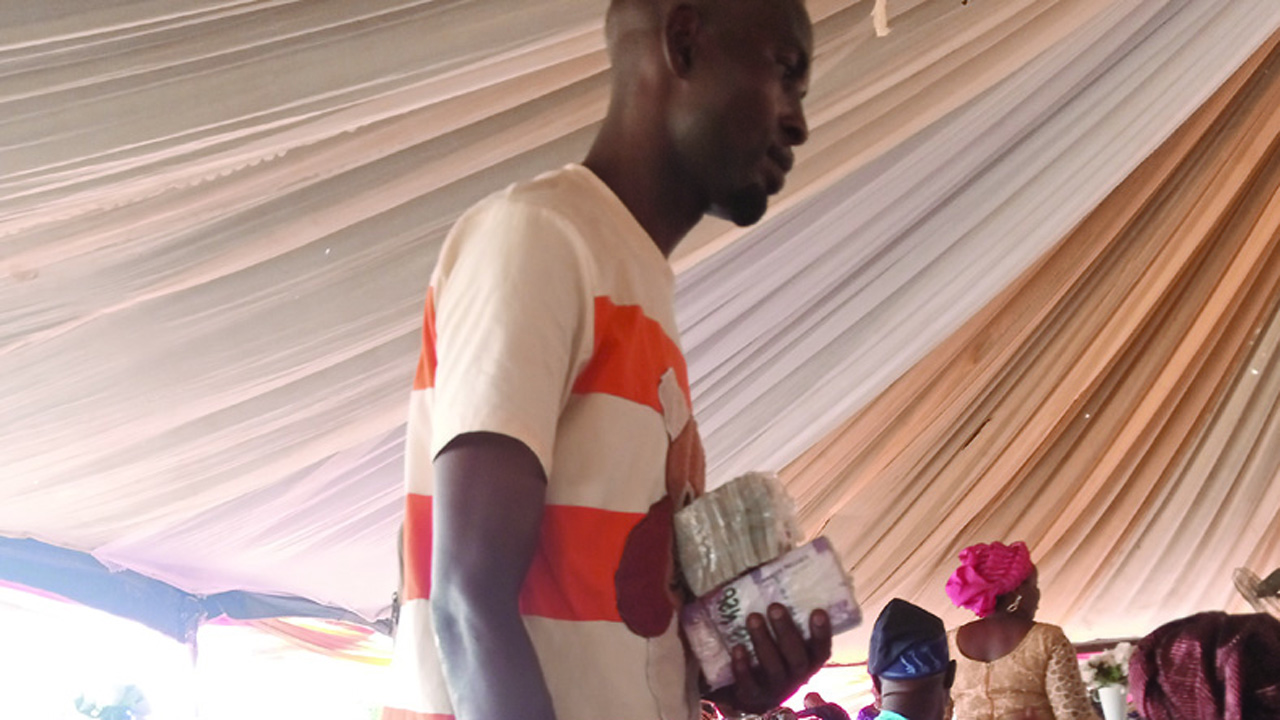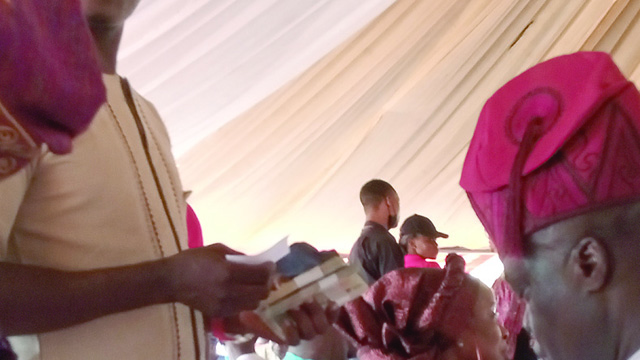
In this report, CHIJIOKE IREMEKA x-rays the modus operandi of the hawkers of the Nigerian currency, why law enforcement agents have failed to halt the illicit trade and experts’ views on how to protect the naira from further abuse.
Racketeering in new naira notes in the country is currently making many people rich but denying the majority of Nigerians the right to clean notes for transactional purposes.

While new naira notes are hardly issued to customers making withdrawals in the banking halls of Deposit Money Banks (DMBs) or dispensed at their Automated Teller Machines (ATMs) galleries across the country, it has become an article of trade on the streets, an act against the laws of the land.
The Guardian’s investigations revealed that aside from Nigerians, foreigners, especially Malians and Beninese were neck-deep into the business.
Trading in naira notes or coins is an act punishable under the CBN Act, 2007. Section 21 of the CBN Act titled, ‘Tampering with or Trading in Naira,’ prohibits anyone from selling or buying naira notes or coins. According to Section 21, sub-section (4) of the Act, “It shall be an offence punishable under sub-section (1) for any person to hawk, sell or otherwise trade in naira notes, coins or any other note issued by the Bank”.
Sub-section (1) provides that, “A person who tampers with a coin or note issued by the Bank is guilty of an offence and shall on conviction be liable to imprisonment for a term not less than six months or to a fine, not less than N50,000 or to both such fine and imprisonment.”
No doubt, the essence of these provisions of the Act is to preserve the integrity of the Nigerian currency and protect it from abuse.
In fact, in Section 21, sub-section (3), the Act further provides that, “For the avoidance of doubt, spraying of, dancing or matching on the Naira or any note issued by the Bank during social occasions or otherwise howsoever shall constitute an abuse and defacing of the Naira or such note and be punishable under Sub-section (1) of this section.”
Notwithstanding these laws, Nigerians brazenly trade in new naira notes and those who patronise the traders said they buy the clean notes to spray on celebrants during weddings, birthday parties, naming ceremonies and other social activities. But how do the traders get the new notes they sell? Do they source them from the commercial banks or there are shady deals in the CBN that gives them access to new naira notes? Also, why have the law enforcement agents failed to effectively enforce the law prohibiting trading in the country’s currency?
Expectedly, officials of some commercial banks who spoke with The Guardian on the matter exonerated their organisations from the illegality, maintaining that they always have a shortfall of supply from the CBN, hence their inability to meet customers’ demands.
An Operations Manager at a branch of a top commercial bank in the country, who spoke to The Guardian on the condition of anonymity said: “We don’t have clean notes. In the past few months, I have not seen them. We used to feed our ATM machines with new notes but now, we don’t even see them again as we used to. During the last festivities, my friends called me, seeking clean notes but I couldn’t give them because I didn’t even have the ones I would spend.
“In our ATMs now, you can find very dirty notes that sometimes get stuck in the machines because they can’t withstand the fast e-sorting of notes in the machines. Often, customers throng bank halls in search of the notes to no avail,” she said.
However, some stakeholders who commented on the issue accused the commercial banks and the CBN of conniving with certain people to break the official channel of distributing new naira notes and replacing it with another arrangement with the purpose of making money for themselves through their agents.
“The CBN and commercial banks should tell Nigerians where the yahoo boys and other moneybags get the crisp naira notes they spend at their colleagues’ functions,” said Mr. Hassan Balogun, a teacher and father of five residing in Lagos State.
He cited an unofficial report, which stated that about N300 million new naira notes were shipped to the Southeast zone when a certain moneybag in the zone buried his mother last year and also during the last yuletide.
According to him, such an amount of new notes usually wrapped in clean nylon could only be sourced from the CBN or senior officials of the commercial banks.
He alleged that the CBN and officials of commercial banks sell the new notes to the hawkers at Tinubu Square in Lagos State.
When The Guardian visited some event centres and churches in the state during weddings and other public functions and interacted with people transacting on new naira notes, some of them said they took delivery of the notes from certain agents, while others said they bought theirs at Tinubu Square and some commercial banks.
At Apple Event Hall in the Apple Junction area of Amuwo-Odofin, Lagos, Moji Solanke was seen with bundles of clean N200 notes and other currency denominations attending to customers who wanted to buy new notes from her to spray on the celebrants.
As The Guardian approached her, she expectantly came forward, saying: “Oga come, I have some naira for spraying,” displaying the clean N200 notes, among other denominations.
When The Guardian indicated interest to buy from her, she explained that every N20, 000 clean note attracts a fee of N6, 000, which amounted to giving her N26, 000 old notes in exchange for N20, 000 new notes.
Asked why she charged so much since she was not adding extra value to the money, she said: “Money is expensive now. We buy it very expensive.”
Her response prompted further probing on where she buys the new notes. “Tinubu Square on Lagos Island,” she replied.
Following the tip, The Guardian headed to Tinubu Square, Marina, with a view to discovering the source of the clean naira notes being hawked on the streets of Lagos. On getting there, it was the same story; people displayed new naira notes like ordinary wares for sale and frantically sought patronage.
One of them, Mutiat Ojuromgbe, a mother with a baby strapped to her back, said she sourced her mints from one of the commercial banks located in the axis.
“I pay N10, 000 to collect N100, 000 from Mr. Joe, a bank official. So, I have to increase my own to N3, 000 for every N10, 000 so that I could make N30, 000 after selling them. Though this depends on the area and the personality of the client. If I see a rich person or somebody who needs it desperately I increase the price,” she said.
After the encounter with her, The Guardian moved into a commercial bank in the area to see if new naira notes could be obtained on request at the counter. The quest ended in disappointment as the cashier who was approached quickly responded that “there is no new note on request.”
Further findings by The Guardian revealed that Tinubu Square was not the only place where new naira notes were being sold in Lagos State.
One Mrs. Uduak Bassey, who has seen hawking new naira notes at a social event in the state, stated that Block 2, C Close, 111 Road, Festac Town, was well known for dealing in new naira notes. Bassey, who said she made over N50, 000 profit after sales on a good business day, revealed that a simple question as ‘where can I get new naira notes,’ was enough for anybody within 21 Road, Festac and environs to locate the dealers.
“There, you get any amount of new notes you want to be provided you are ready to part with the handsome amount in exchange,” she added.
When The Guardian visited the place, pretending to be a potential customer, a teenage girl came out from the living room to attend to the supposed customer.
“I need new notes of N20, 000,” The Guardian said. “N20, 000 for N24, 400,” she responded. The Guardian offered to pay N2, 000 instead of N4, 400, but the young girl bluntly refused and walked back into the living room.
The Guardian repeated the visit another day primarily to sniff around for vital information on the source of the clean notes they sell. This time, a woman was seen. However, she apparently felt that giving out such information wasn’t safe for her business and declined to do so.
Even though trading in the Nigerian currency is illegal, findings showed that the business has been going on for decades and has lifted some families out of poverty.
Somewhere in Mushin, Lagos, a woman, identified as Mama Wasiu, who lost her husband many years ago, went into the business and was able to fund the tertiary education of her four children with proceeds from it. The woman, who is in her late 60s now, has also built a house in the state with proceeds from the business.
Today, she has co-opted her children into the business as it was gathered that two of her daughters who are married to Ibadan and Ogun indigenes were thriving in the business in their new homes. The Guardian also learnt that her first son has been successfully combining his white-collar job with the business.
When contacted to speak on the flourishing but illegal trade and the alleged involvement of officials of the CBN, the Bank’s Director of Corporate Communications, Mr. Osita Nwanisobi, said he wasn’t aware of any racketeering between the apex bank, its workers and those trading in clean naira notes.
“Ask them (commercial banks) where they keep the money if they said CBN doesn’t give them clean money. I am not aware of what is happening and why new notes can’t be accessed in the commercial banks,” he said.
On the allegation that some CBN staff may have ruptured the proper channel of distributing new naira notes to be dealing directly with individuals other than banks for monetary gains, he quipped: “It’s not possible; that can’t happen.”
When asked whether the CBN still supplies new notes to commercial banks, he replied: “If I ask you whether CBN mints and distributes new notes, you would say yes. And like I said, I don’t know what is happening. But I will find out; it is my responsibility to find out.”
An official of the apex bank, who spoke on the condition of anonymity, however, agreed that there could be some level of connivance between the apex bank’s staff, the commercial banks and the vendors, noting however that anyone caught in the act would be decisively dealt with.
Another official of the CBN, who spoke on how new currency notes were being distributed, explained that the Currency Operations Department was responsible for currency management through the planning, procurement, distribution, processing, reissue and disposal of banknotes and coins.
“CBN evacuates the finished banknotes from Nigerian Security Printing and Minting (NSPM) Plc., for distribution to all CBN branches. The branches further distribute the banknotes to (DMBs) where they are finally released to the public via withdrawals,” explained the source who pleaded anonymity.
The source said people who want to sell or buy new notes might have broken this chain, adding that only corruption could make that possible.
“Anything that goes wrong here should be the responsibility of this department,” the source added.
Recently, officials of the CBN and operatives of the Nigeria Police Force (NPF) deployed from the Lagos State Criminal Investigation and Intelligence Department (SCIID), Yaba, arrested 12 new naira notes vendors during a joint raid in many parts of the state.
The Deputy Commissioner of Police in charge of SCIID, Salami Bolaji, had noted that the action of the vendors contravenes the CBN Act, hence their arrest.
He said: “We are clamping down on those abusing our currency. It is an offence to sell naira notes at weddings or any gathering. It contravenes the CBN Act. We recovered N35, 500 from the former raid, while N465, 000 was recovered from those arrested last week. They would be charged to court as soon as possible.
“Investigation is ongoing to reveal how these suspects came about these new currencies. We are going to get to the root of it because the offence is punishable by N50, 000 fine or six months imprisonment or both. No good country will allow its currency to be abused in any way. That is what we are guarding against. CBN is out to enforce the law and we will give them the necessary backing.”
The suspects, who said they ventured into the business to eke out a living, feigned ignorance of the CBN Act, which prohibits trading in naira notes or coins. However, it was gathered that they were not ready to reveal the suppliers of the new naira notes they were hawking.
One of them, who simply identified herself as Abidemi, who was arrested in the Alagbado area, had told the police that one Abdulahi supplied her the new notes, saying: “I do not know where he works. He usually brought them to me. But some of my colleagues get theirs from banks.
“If I knew it was illegal to sell new naira notes, I would have run away when I saw the police coming. I was not going to party venues to sell; I stayed at the bus stop where people come to meet me. Now that I know that it’s illegal, I will quit the business.”
A member of staff of the CBN, who spoke during the raid but pleaded not to be named, said connivance with members of staff of the apex bank as well as those in the DMBs might not be ruled out completely.
He threatened that any bank staff, whether of the CBN or any of the commercial banks, found to be aiding the illegal trade would be arrested and prosecuted.
“We know that these are not the real targets. If they do not get the mint notes, they won’t be able to sell. So, our main targets are commercial banks and even our staff, who release this money to these vendors. Once these suspects confess and mention their names, we would go after them.
“We are also going to start arresting Nigerians who organise events and allow those selling naira notes in their venues. Already, we have started arresting people who spray money at social events. Sanity must return to our system and our currency must be respected,” he said.
Commenting on illegal trading in new naira notes, the Executive Director of Adopt A Goal Initiative, a Civil Society Organisation (CSO), Ariyo-Dare Atoye, said the CBN Act was meant to protect the Nigerian currency but lamented that the socio-cultural lifestyle of the people was almost making it impossible.
Atoye said: “It’s bad that Nigerians buy naira with 10 per cent interest for every N1, 000. Our flamboyant lifestyle across all classes has made it difficult for this law to succeed. More so, the countless economy like this has also made it impossible for this anomaly to stop. If we have coins in N100 and N200, it would address this issue to a reasonable extent.
“The officials and law enforcers cannot do much because we are all in it. I went to Edo State the other day and people were spraying N50 notes. At all levels, you will see this happening.
“Funny enough, the leadership doesn’t also believe in the policy. We have a leadership problem. For a solution, the leadership should show interest in prosecuting the offenders but they won’t because they will always interfere.
“When you apprehend these vendors and punish them, then they will stop. Also, some of them are not aware of this law and that is why you see them indulging in this illegality. So, we need to create awareness on this so that the naira notes would be protected.”






